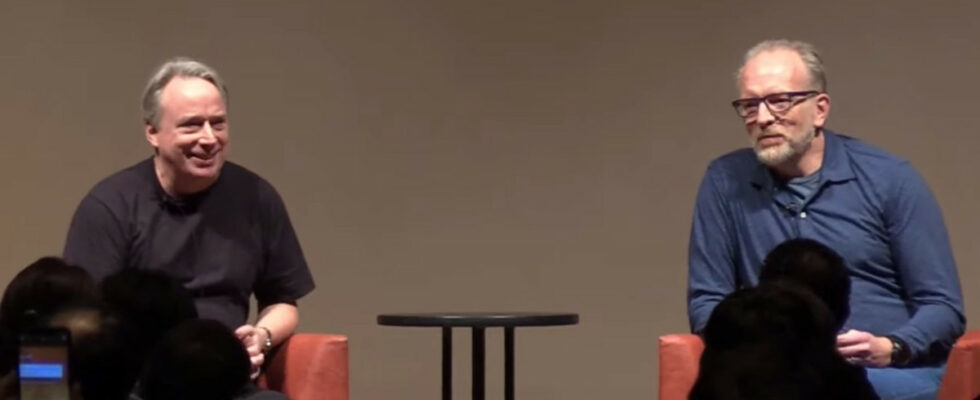Linus Torvalds, the founder of Linux, has been keeping a low profile lately. But at the Linux Foundation’s Open Source Summit Japan, Torvalds and his good friend Dirk Hondhel, open source manager at Verizon, discussed the current state of Linux.
First, they talked about the next version of the Linux kernel, Linux 6.7. Before arriving in Tokyo, Torvalds released the fourth release candidate of 6.7. This means that if all goes well, and Torvalds sees no reason to think it won’t, the next version of Linux will arrive around Christmas.
To ensure that maintainers and developers who are currently preparing the next release, 6.8, don’t panic because they know that after Christmas my merge window will open, we will probably delay it by ‘a week or two so that the schedule is better respected, because no one wants to work during the Christmas period.’
The difficulty of recruiting Linux maintainers
Speaking of maintainers, the developers who maintain Linux, Hondhel raised the issue of “maintainer fatigue, whose role is exhausting and stressful.”
“It’s easier to find developers; we have a lot of them. But some people think you have to be a super-developer who can do anything to be a maintainer, but that’s not true,” Torvalds said. “To be a maintainer,” he continues, “you have to have a certain taste for judging the code of others. Some of these qualities may be innate, but a large part is the result of practice. You have to be able to to look at other people’s code and say, “Is this a good or bad approach?” It’s usually a matter of experience, gained over years.
That said, Torvald adds, “We have a lot of great maintainers, but you also have to be there all the time. Or you have to find other maintainers you can work with, so you can plan your vacation.
Open source is also communication
For Torvalds, “being there all the time is not a problem because I love what I do. I was on vacation a few months ago and I had my laptop. If I hadn’t had my laptop with me, I would have been bored. But I realized that this is not everyone’s life.”
In 2018, Torvalds decided to review his commitment and attitude. He took a break to work on his behavior towards other developers. Once that was done, Torvalds returned to his work on the Linux kernel. And since then, he has been much more moderate. As he indicated in Tokyo, he will no longer “give the finger. I have learned my lesson”.
In summary, Torvalds said: “A lot of people seem to think that open source is all about programming. But a lot of it is also about communication. The maintainers are the ones who translate. I’m not necessarily talking about the language. I mean the context, the reason for the code. It’s hard work. But if you want to be a maintainer, believe me, there’s room at the top.”
The Linux community… is getting old
A related problem is the aging of the Linux kernel community.
Hondhel remarked. “If I project myself into five years, many members of the Linux kernel will reach their 60s, and the first few will approach 70.”
It’s true, Torvalds admitted, “a lot of us are getting older, but at the same time, part of that is that we have maintainers who have been here for over 30 years. They are still there, still active. We have a community where people stay.”
“Rust has not yet established itself as the next big thing”
Mr Hondhel believes the aging core community is a “double-edged sword”. Torvalds agrees, but he qualifies. “With the introduction of Rust to the core, we have a maintainer who is clearly much younger than most. Some areas of the core are more attractive to younger people.” As for the drivers too, it is much easier to find young people.
Hondhel and Torvalds also talked about using the Rust language in the Linux kernel. Torvalds said: “It’s growing, but we don’t yet have a part of the core that really depends on Rust.”
That said, Torvalds added, “Rust hasn’t established itself as the next big thing yet. But I think over the next year we’ll start to integrate major drivers and subsystems that will start using it actively. It’s going to take years to become a significant part of the core.”
“Artificial intelligence is self-correction on steroids”
Looking to the future, Hondhel said we need to talk about “large-scale language models (LLMs) of artificial intelligence.”
“Artificial intelligence is self-correction on steroids. Indeed, all a large language model does is predict what is the next most likely word you are going to use. Then it extrapolates, which which is not really very intelligent. But it is obvious that the impact of AI on our lives and the reality in which we live is significant,” he said. “Do you think we’ll see LLM-generated code coming?”
Torvalds replied: “I’m convinced it will happen. And it may already be happening on a small scale.” But, unlike many people, Mr Torvalds isn’t too worried about AI. “Automation has always helped people write code. It’s not new at all,” he says.
In fact, Torvalds hopes that AI could really help him by being able to “find the stupid, obvious bugs because a lot of the bugs I see are not subtle bugs. There’s no need to have a superior intelligence to find them. I see AI as a tool that can help us be better at what we do.”
Source: “ZDNet.com”
